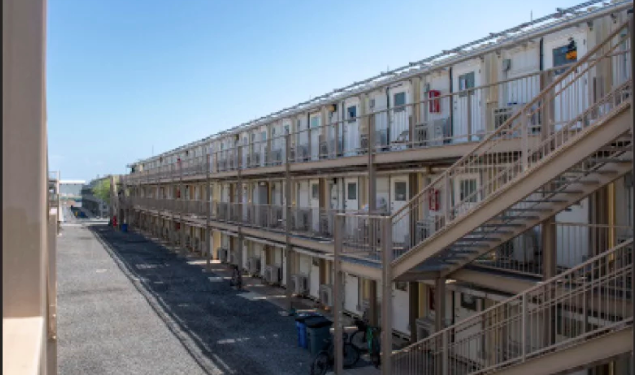At Camp Lemonnier, a U.S. military installation in Djibouti, East Africa, thousands of personnel are accommodated in “Containerized Living Units” (CLUs), which the military compares to shipping containers. Recently, it has come to light that a group of deported migrants is being detained within one such modified shipping container, as detailed in court filing.
According to a filing from Thursday, these individuals are monitored around the clock by a small contingent of U.S. Immigration and Customs Enforcement (ICE) officers. Several migrants have reportedly been confined at this base for over two weeks after their flight—initially destined for South Sudan—was redirected mid-journey following a federal court ruling. This decision stemmed from legal challenges against the Trump administration’s attempts to deport them to South Sudan. Their legal case has now escalated to the Supreme Court, which may render a decision at any moment.
Since the aircraft’s landing in Djibouti, ICE personnel have faced significant limitations in resources, resulting in the migrants experiencing minimal contact with their families and no communication with their legal representatives. On Wednesday, attorneys representing the migrants indicated that some detainees managed to reach out to family members for the first time since boarding the flight on May 20.
ICE has not provided an immediate response regarding the ongoing situation of the officers and detainees in Djibouti.
Challenging Conditions of Detention and Work
In the Thursday court submission, Mellissa Harper, the acting deputy executive associate director at ICE, stated that the migrants are being housed in a conference room located within a repurposed Conex shipping container at Camp Lemonnier. The team of ICE officers consists of 11 individuals tasked with overseeing the deportees and an additional two officers assigned to assist medical staff. These officers are working 12-hour shifts but lack the necessary resources to ensure continuous surveillance and care for the detainees over extended periods.
Harper noted that temperatures in the area where the migrants are held have frequently surpassed 100 degrees Fahrenheit. The room designated for the detainees is not equipped nor appropriate for extended detention, and ICE personnel are sharing limited sleeping arrangements with just six beds.
She raised multiple concerns about health risks, including exposure to malaria and proximity to “burn pits,” which are used for waste disposal in the region. These pits create smog that can lead to throat irritation and breathing difficulties. Both officers and detainees reported feeling unwell within three days of their arrival at the base; some officers resorted to wearing N-95 masks while sleeping due to health concerns, yet access to medication remains restricted.
“ICE officers continue to experience symptoms such as coughing, difficulty breathing, fever, and joint pain,” Harper stated in her declaration. “These symptoms suggest a bacterial upper respiratory infection, but proper testing for diagnosis is inaccessible.”
Additionally, Harper highlighted potential risks from terrorist attacks. Both ICE personnel and detainees lack protective equipment such as body armor in case of assaults from terrorists operating in Yemen, located across the Gulf of Aden from Djibouti.
Circumstances Surrounding the Flight’s Diversion
On May 20, reports emerged indicating that the U.S. intended to deport a group of men, supposedly to South Sudan. A Homeland Security filing presented in federal court in Massachusetts outlined that among those aboard were two individuals from Cuba and two from Burma, as well as others hailing from Laos, Mexico, and Vietnam.
All individuals listed possess criminal records, according to government filings, with officials from the U.S. Department of Homeland Security asserting that their countries of origin had declined to accept them back.
On May 21, federal judge Brian Murphy issued an order mandating that the migrants remain in the custody of DHS rather than being released into South Sudan, thereby granting them additional time to contest their deportation. Judge Murphy did not specify a geographical location for holding the detainees, resulting in their detention in Djibouti.
Subsequently, on May 27, Solicitor General D. John Sauer requested that the Supreme Court impose a stay on Judge Murphy’s injunction concerning deportations. Sauer informed the court that the Trump administration had “been compelled to establish a makeshift detention facility for dangerous criminals at a military base in Djibouti.”
Following this development, the original team of ICE officers assigned to oversee the deportation mission was replaced and augmented on May 27.
Overview of Camp Lemonnier
Camp Lemonnier covers nearly 500 acres and serves as the primary operational base for U.S. Africa Command in the Horn of Africa, according to Navy sources. Located south of Djibouti–Ambouli International Airport, it accommodates around 4,000 personnel consisting of both U.S. military and allied civilian staff.








